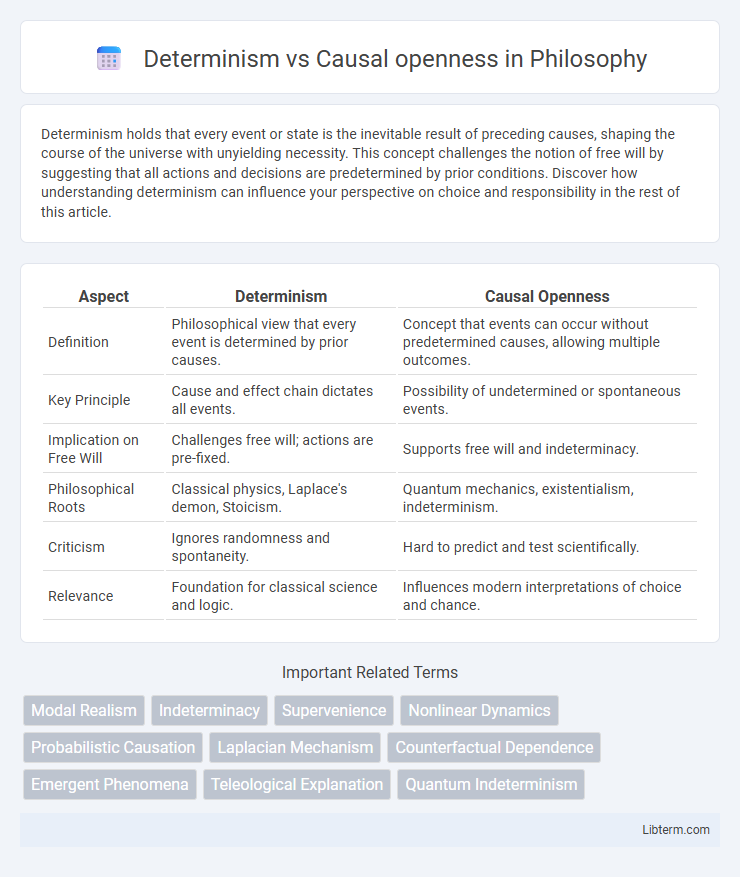Determinism holds that every event or state is the inevitable result of preceding causes, shaping the course of the universe with unyielding necessity. This concept challenges the notion of free will by suggesting that all actions and decisions are predetermined by prior conditions. Discover how understanding determinism can influence your perspective on choice and responsibility in the rest of this article.
Table of Comparison
| Aspect | Determinism | Causal Openness |
|---|---|---|
| Definition | Philosophical view that every event is determined by prior causes. | Concept that events can occur without predetermined causes, allowing multiple outcomes. |
| Key Principle | Cause and effect chain dictates all events. | Possibility of undetermined or spontaneous events. |
| Implication on Free Will | Challenges free will; actions are pre-fixed. | Supports free will and indeterminacy. |
| Philosophical Roots | Classical physics, Laplace's demon, Stoicism. | Quantum mechanics, existentialism, indeterminism. |
| Criticism | Ignores randomness and spontaneity. | Hard to predict and test scientifically. |
| Relevance | Foundation for classical science and logic. | Influences modern interpretations of choice and chance. |
Introduction to Determinism and Causal Openness
Determinism asserts that every event or state is the inevitable result of preceding causes governed by natural laws, emphasizing a predictable and fixed universe. Causal openness challenges this by proposing that not all events are predetermined, allowing for genuine possibilities and indeterminacy within systems. Understanding the contrast between deterministic frameworks and causal openness is crucial for exploring debates in philosophy, quantum mechanics, and complex system behavior.
Historical Perspectives on Causality
Historical perspectives on causality reveal a nuanced evolution from strict determinism, as championed by classical Newtonian physics, to more open causal frameworks influenced by quantum mechanics and chaos theory. Early philosophers like Aristotle emphasized four causes, integrating purpose and necessity, while Enlightenment thinkers prioritized efficient causes aligned with predictable laws. Modern scientific developments challenge deterministic views by highlighting indeterminacy and probabilistic events, reshaping debates around causal openness in contemporary philosophy and physics.
Defining Determinism: Key Concepts
Determinism is the philosophical doctrine that every event or state of affairs, including human decisions, is the inevitable result of preceding causes governed by natural laws. It emphasizes causal necessity, where given specific initial conditions, only one future outcome is possible. This concept contrasts with causal openness, which allows for multiple potential outcomes and highlights the influence of indeterminacy or free will in shaping events.
Understanding Causal Openness
Causal openness refers to systems or processes where outcomes are not strictly determined by prior states, allowing for multiple potential futures and inherent unpredictability. Unlike determinism, which asserts a fixed causal chain leading to inevitable results, causal openness acknowledges the influence of stochastic factors, external interventions, or emergent properties. Understanding causal openness enhances modeling in complex systems such as quantum mechanics, evolutionary biology, and cognitive sciences, where non-deterministic interactions play pivotal roles.
Philosophical Arguments: Determinism vs Causal Openness
Determinism posits that every event, including human actions, is causally determined by preceding states according to universal laws, implying inevitability and predictability in the universe's unfoldment. Causal openness challenges this by arguing that not all events are predetermined, allowing for genuine novelty, randomness, or agent causation that breaks deterministic chains. Philosophical debates center on whether the universe is a closed causal system or if indeterminism and free agency introduce multiple possible outcomes beyond deterministic predictability.
Scientific Implications in Physics
Determinism in physics asserts that every event is causally determined by preceding events according to fixed laws, implying a predictable universe governed by classical mechanics. Causal openness challenges this by introducing indeterminacy, especially highlighted in quantum mechanics where outcomes are probabilistic and not fully determined by prior states. The scientific implications include a paradigm shift from Newtonian determinism to frameworks accommodating uncertainty, fundamentally altering predictions, experimental interpretations, and the philosophy of science.
The Role of Free Will and Agency
Determinism asserts that every event, including human decisions, is the inevitable result of preceding causes, challenging the existence of free will and agency. Causal openness posits that not all events are predetermined, allowing for genuine choice and autonomous action within complex systems. This debate critically examines how free will can coexist with natural laws and whether human agency can influence outcomes beyond fixed causal chains.
Determinism in Ethics and Morality
Determinism in ethics asserts that every human action stems from preceding causes, challenging the notion of free will and moral responsibility. It implies that ethical behavior is the result of predictable causal chains, potentially limiting individual accountability. This perspective shapes debates on justice, punishment, and moral praise by questioning whether people can truly choose their actions independently.
Contemporary Debates and Thought Experiments
Contemporary debates on determinism versus causal openness revolve around the predictability of events and the existence of genuine indeterminacy in physical systems. Thought experiments such as Schrodinger's cat and the Libet experiment challenge classical determinism by illustrating quantum uncertainty and the timing of conscious decisions. Recent philosophical discussions integrate findings from quantum mechanics and neuroscience to argue for a model of reality where causal openness allows for multiple potential outcomes and genuine free will.
Conclusion: Reconciling Determinism and Causal Openness
Reconciling determinism and causal openness involves recognizing that while deterministic laws govern the underlying structure of reality, causal openness allows for emergent phenomena and genuine novelty within those frameworks. Advances in quantum mechanics and complexity science demonstrate that fixed initial conditions do not preclude multiple possible outcomes, integrating predictability with probabilistic events. This synthesis reframes causality as a dynamic interplay between determined processes and adaptable contingencies, preserving both order and freedom in natural systems.
Determinism Infographic

 libterm.com
libterm.com